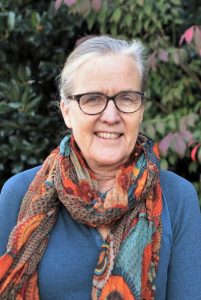 There’s been a lot of buzz recently about the innovative approaches Alice Ammerman and her colleagues are taking in the area of local, sustainable agriculture. Ammerman is the director of the UNC Center for Health Promotion and Disease Prevention (HPDP) and a professor in the Department of Nutrition at the UNC Gillings School of Global Public Health.
There’s been a lot of buzz recently about the innovative approaches Alice Ammerman and her colleagues are taking in the area of local, sustainable agriculture. Ammerman is the director of the UNC Center for Health Promotion and Disease Prevention (HPDP) and a professor in the Department of Nutrition at the UNC Gillings School of Global Public Health.
Sustainable food is the subject of a three-part series in the Daily Tar Heel this week. This series, and an article in a recent Carolina Alumni Review, focus on Ammerman’s research and personal efforts to bring attention to eating local and healthy foods.
The Gillings Innovation Laboratory Project, Linking local, sustainable food systems and health: How does eating local impact obesity, the environment and economic viability? was also featured in a seminar at the UNC Gillings School of Global Public Health on March 1. The seminar included a reception where local foods were served on compostable plates.
This project was awarded through the UNC Department of Nutrition in the UNC Gillings School of Global Public Health and is being conducted with support from HPDP. The research includes partnerships with researchers, community members and students to conduct multi-disciplinary research.
“Food is a great way to bring people together. There’s just a lot of passion,” said Ammerman.
Ammerman and her team have spun off several related ideas including a farmers’ market geolocator tool in collaboration with the Rennaissance Computing Institute, a Tar Heel Guide to Restaurants and Caterers Using Local Food, and community gardens. More information about the project can be found at the project’s blog.
During her seminar presentation, Ammerman said the project is uncovering surprising data. Her research has shown that kids who grow their food are more open to eating different fruits and vegetables, which could help combat the national epidemic of childhood obesity.
Additionally, a review of food policies revealed that North Carolina is not taking advantage of some important federal funding opportunities. The federal program called SNAP-Ed allows states to match food stamp funding in order to get more funding for local food systems. According to the GIL team’s research, North Carolina is only getting $1.13 per SNAP recipient, whereas California is getting $41.35.
Ammerman’s team has also convinced UNC to let them use some of the university’s land for a Carolina campus community garden. Ammerman hopes to have workshops so people can learn about gardening similar to the victory garden concept.
Lastly, the team has begun designing a local food system in Warren County with the help of students at the UNC Kenan-Flager Business School to test if local food systems can work outside of the Chapel Hill-Carrboro.
“It’s pretty impressive when someone can describe your work as a movement and not just a project,” said Jimmy Rosen, the moderator of the event and a member of the Acceleration Advisory Committee for the UNC Gillings School of Global Public Health. “There’s a tremendous amount of passion behind them. This is meaningful work and work that’s going to change the future for the better.”
